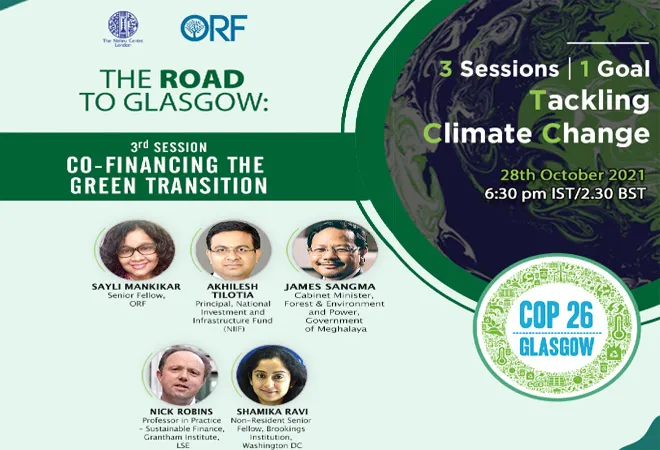-
CENTRES
Progammes & Centres
Location

On October 28, 2021, Observer Research Foundation (ORF), in collaboration with the Nehru Centre, London, hosted the third and final session of “The Road to Glasgow”, a three-part series on the UK-India partnership leading up to COP26 and beyond. The theme of the session was “Co-Financing the Green Transition”, and discussed the importance of investments to achieving a sustainable transition and the potential of co-financing the mission for a green future.
The event opened with a welcome address by Sayli Mankikar, Senior Fellow, ORF, and was moderated by Shamika Ravi, Non-Resident Senior Fellow, Brookings Institution, Washington DC. It featured Akhilesh Tilotia, Principal, National Investment and Infrastructure Fund (NIIF)’ James Sangma, Cabinet Minister, Forest & Environment and Power, Government of Meghalaya; and Nick Robins, Professor in Practice - Sustainable Finance, Grantham Institute, as panellists.
Tackling climate change requires huge investments, and transitioning to sustainability means marshalling investments into the right initiatives and destinations. There are several sectors in India that provide a huge window for such investments, like energy and mobility, but attracting international financers will take transformative interventions supported by new thinking and more favourable borrowing terms. As conversations take place on procuring financial backing for India’s green transition, it is worth considering the catalytic role that London could play in achieving that goal.
Professor Ravi pointed out the common agenda formulating between states, the private sector, and academia who are beginning to see the significance of this green transition and its strategic importance to emerging markets and economies, especially for nations like India and China.
Akhilesh Tilotia highlighted the central role played by National Investment and Infrastructure Fund (NIIF) in the conversation surrounding green finance and investment, and also pointed out the fact that investment also translates into the availability of finance. When thinking about investments, stranded assets, people and business models must also be taken into consideration, as well as the question of ability and availability of instruments to provide finance.
He also spoke of the public–private partnership element—private investors seeking economic returns; public investors, like governments (whether it’s a sovereign effort or a global collaboration); and philanthropy, the capital which could commit long term to bigger experiments with the knowledge that there would be no guarantee of success, impact or return, but could potentially unlock new technology or market element. It is also imperative to find the balance between green premiums and the ability to adopt green to ensure a seamless transition to a sustainable future with consumer satisfaction.
James Sangma laid emphasis on the importance of climate recovery efforts to the forest economy of Meghalaya. Identifying climate change as both a political and economic crisis, he pointed out the need to take on the daunting task of overhauling existing systems and consumer behaviour, leading to a societal shift. He spoke extensively on the development of Meghalaya as an ‘environment state’, and the creation of innovative green livelihoods by making strides in climate action and conservation. He also pointed out the need to strengthen natural capital to make it more resilient to future ecological stressors.
Professor Robins brought an international perspective to green financing, specifically on the role of the UK and its partnership with a key emerging economy like India. He pointed out that while recognising the progress made thus far, it is key to remember the significant amount of assets in the banking investment sectors that are allocated towards fossil fuels and other practices that are degrading nature. He also mentioned the need to make changes in the current decade and ramp up the deployment of techniques in clean energy, particularly in emerging markets like India. It is also imperative that the sustainable solutions be effective long-term in improving incomes and quality of life, while also reducing the cost of capital. With regards to mobilisation, despite great contributions being made by domestic bodies of India in financing, there could be greater action from institutional investors, as well as developing India to become an attractive destination for routine large allocations of international public and private funds.
James Sangma explained various innovative projects undertaken by Meghalaya in tackling climate change and leveraging nature as an asset. Professor Robins spoke about breaking down development plans from the global and national level to the stranded or potentially stranded regions and improving green skills and capacity at a sub-national level.
The panel also discussed the binding constraints holding investors back from financing India’s green transition. Easing the process, bringing together stakeholders, prioritising destinations and experiments, and reimagining the system would help fix the design flaws of the existing model, and attract greater investment to projects and sectors that would help India transition to a green and sustainable future.
This event report has been written by an ORF intern, Noyontara Gupta.
The views expressed above belong to the author(s). ORF research and analyses now available on Telegram! Click here to access our curated content — blogs, longforms and interviews.